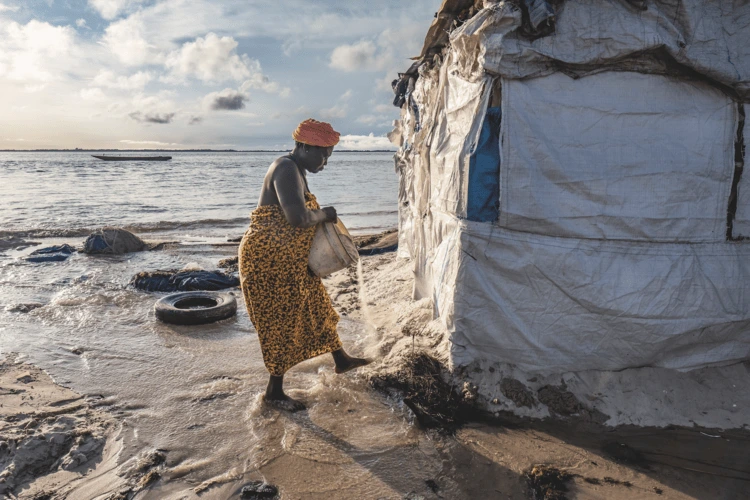
From the effects of dwindling birth rates to healing Ukraine’s citizens amid ongoing conflict, discover what’s in the latest issue of Geographical
In our January issue, discover how birth rates are plummeting around the world and what it means for the planet, find out about the plight of Ukraine’s eastern villages amid a health crisis and take a deep dive into the illegal killing of hen harriers in England. Tim Marshall looks at the impact of 2024’s election results and Marco Magrini considers whether the world’s inaction on climate change will spell disaster for a sustainable future.
For inspiration for your next holiday destination, explore which countries are leading the way in sustainable travel in our latest Geo-Graphic.
Our cover story this month uncovers how Sierra Leone’s once thriving island of Nyangai is succumbing to rising tides driven by the impact of climate change, dwindling its thousands-strong community to just a handful of families who are battling to protect their homes.
Indulge in the joys of food and travelling in our interview with food writer Carolyn Boyd, and journey with Rory Walsh as he grapples with the strange, narrow spit of land off the Humber Estuary. Meanwhile, Tristan Kennedy explains the intersection of art and science when snowboarding in remote locations and offers his top picks of gear to maximise your fun on the slopes.
Our digital edition is out now, and you can not only read all the great stories in that issue, but our app also gives you access to our full archive dating back to 1935 with hundreds of magazines to explore. And if you want to enjoy our beautifully designed and produced print magazine, we can post the next edition to you anywhere in the world. Join us and stay on top of the world!
The sinking shores of Sierra Leone
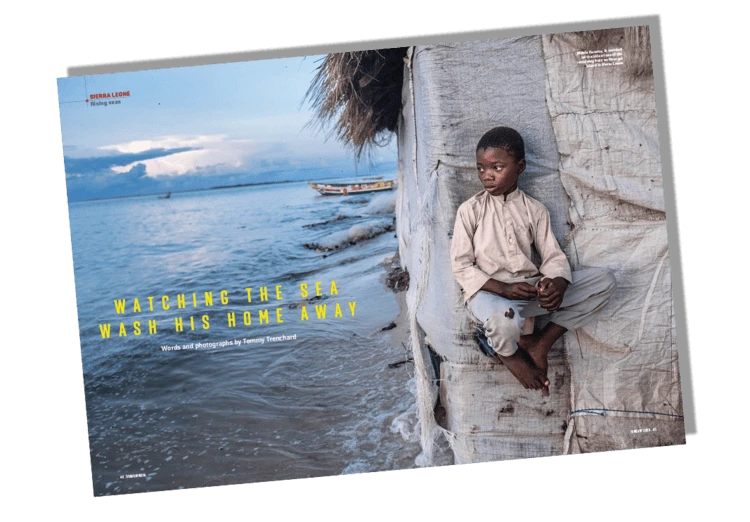
Life on Nyangai Island is slipping away, one wave at a time. Once a flourishing island home to thousands, it has shrunk dramatically under the unrelenting force of coastal erosion that has left entire villages swallowed, with skeletal trees and submerged homes in its wake. For coastal communities who cannot simply move further inland, the devastation that climate change can wreak is stark.
Football pitches now lie beneath the water, and makeshift barriers crumble daily as the ocean advances. Today, only a few hundred people remain on the island, clinging desperately to what little dry land is left. As the Atlantic Ocean claims more of the island, Chief Mustapha Kong, whose family has lived on Nyangai for generations, has lost his home multiple times and is desperate for government intervention that never comes.
With every high tide, the fear of total displacement looms larger. Could the plight of Nyangai’s residents be a harbinger for other coastal communities worldwide? Tommy Trenchard chat, facing the relentless challenges of flooding, dwindling resources, and an uncertain future.
Ukraine’s fragile lifeline of frontline medicine

War has scarred Ukraine’s eastern regions, leaving a healthcare system on the brink of collapse. In Zaporizhzhia’s City Hospital No. 9, staff use makeshift tools to perform life-saving surgeries in sweltering conditions with outdated equipment. Sean Sutton captures the harrowing reality faced by UK-Med volunteers, such as nurse Rosemary Loughlin, who traded the familiarity of the NHS for a frontline hospital where even basic supplies are scarce.
Imagine drilling through bone with blunt tools or stitching wounds with hand-cut fabric swabs: these are the daily challenges confronting medical staff.
Russian attacks on infrastructure have left communities without power, further straining an already fragile system. The hospital is inundated with patients, from burn victims caught in landmine blasts to civilians suffering from chronic conditions exacerbated by war. Despite these grim conditions, hope endures. UK-Med has trained thousands of local healthcare workers, bringing expertise and much-needed resources to conflict zones.
Global heat, political chill
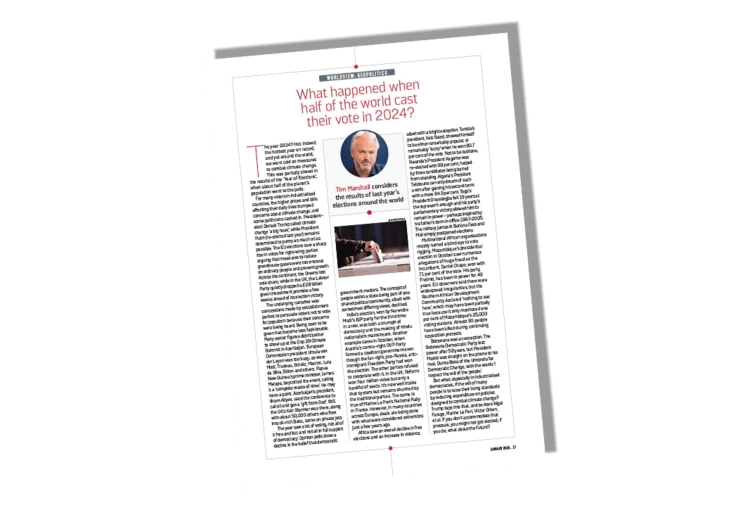
2024 was the hottest year on record, yet global leaders went cold on climate action. At Cop 29 in Azerbaijan, oil-rich leaders praised fossil fuels, while many of the planet’s most powerful politicians simply didn’t show up.
Back home, voters in Europe turned away from green policies, and in the UK, Labour quietly dropped a £28 billion green investment pledge before winning the election.
As the EU swung to the right and populist leaders downplayed environmental concerns, major promises went unfulfilled. At COP29 in Azerbaijan, fossil fuels were lauded as ‘gifts from God’, and leaders like Modi, Trudeau, and Macron skipped the summit altogether. In the UK, Labour dropped a £28 billion green investment plan just weeks before winning the election. Across Europe, Green parties lost vote shares to right-wing populists arguing that climate policies burden ordinary people.
Tim Marshall chronicles this troubling year, where soaring energy prices and economic hardships dominated the political agenda, uncovering how political expediency has stalled climate action, with catastrophic consequences for our planet’s future.
The century of decline
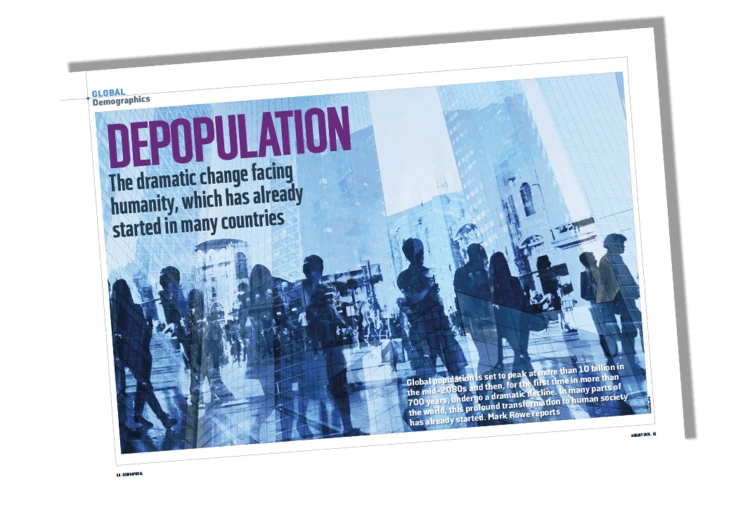
What happens when the world stops growing? For the first time in seven centuries, global population growth is set to reverse, marking a dramatic demographic shift with profound implications for humanity. Mark Rowe unpacks this turning point, exploring the stark contrasts between nations with declining populations and those experiencing rapid growth.
In developed countries such as Japan, Italy, and South Korea, shrinking populations are already creating economic and social challenges. Japan, for example, is projected to lose over a third of its population by 2100, falling from 124 million to just 77 million. South Korea faces an even steeper decline, potentially losing more than half its population by the century’s end.
Meanwhile, parts of Africa are experiencing the opposite trend. Niger’s population is expected to more than triple, growing from 26.5 million to over 90 million by 2100. Across the continent, countries such as Nigeria and Ethiopia will drive Africa’s population from 1.5 billion to 3.8 billion, creating an enormous labour force. However, rapid growth also brings challenges, including the need for sustainable urban infrastructure, food security, and access to education.
A particularly striking milestone looms in the 2030s, when the number of people over 80 will outnumber infants globally for the first time. All these changes will form a seismic shift, raising profound questions about labour markets, healthcare, and the future of global power.
Looking to sustainable travel
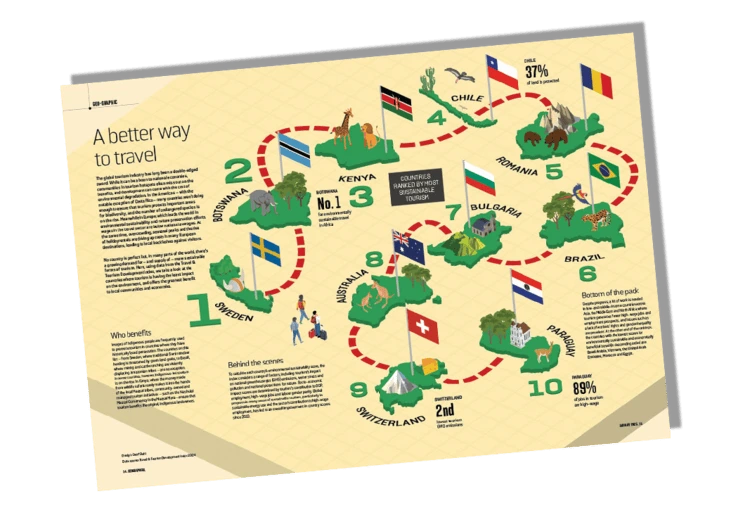
Tourism is evolving, but not all change is equal. This month’s Geo-Graphic explores the rise of sustainable travel, spotlighting countries that are balancing economic growth with environmental stewardship. Botswana leads Africa in eco-tourism, while Chile protects 37 per cent of its land for conservation. Kenya’s Maasai communities are championing Indigenous-led tourism, but overtourism remains a growing issue in Europe, where housing costs are soaring due to holiday rentals.
Whether you’re planning your next adventure or curious about the future of tourism, our Geo-Graphic will inspire you to wander wisely.
The vanishing spectacle of hen harriers
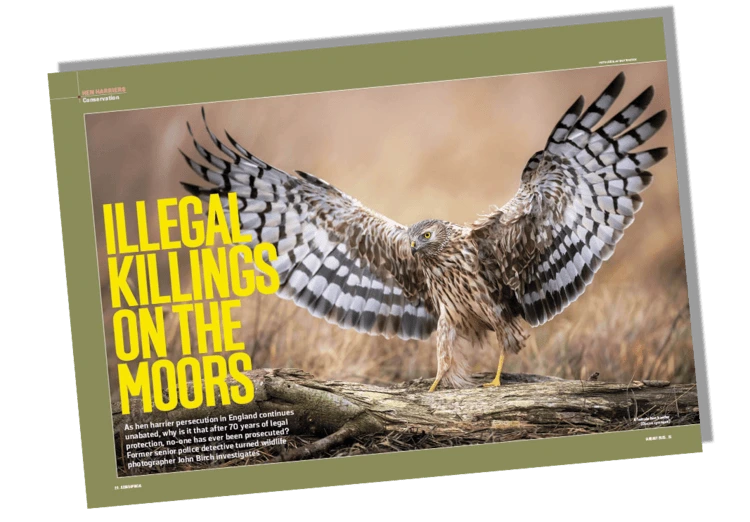
In the desolate beauty of England’s uplands, the hen harrier’s acrobatic sky-dance masks a chilling reality: this magnificent bird of prey is being pushed to the brink. Once decimated by hunting in the 19th century, its numbers remain perilously low despite legal protection. John Birch, a former detective turned wildlife photographer, exposes the grim truth behind their disappearance.
From satellite tags inexplicably vanishing to carcasses found in remote grouse moors, the evidence points to foul play. In one instance, tags were found attached to live carrion crows, an attempt to cover up the death of a hen harrier. Gamekeepers have been accused of illegal killings to protect grouse-shooting interests, yet prosecutions are glaringly absent. Why has no one been held accountable for these crimes?
Birch dives into the murky world of wildlife crime, unravelling a tangled web of denial, evasion, and systemic apathy that enables the killings to persist unchecked.




